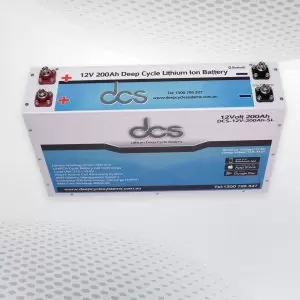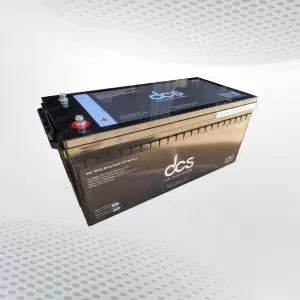As the world shifts towards a greener and more sustainable future, the automotive industry is also undergoing a significant transformation. One of the key components driving this change is the lithium car battery. These advanced batteries have revolutionized how we power our vehicles, offering increased efficiency, longer range, and reduced emissions. In this blog post, we will dive into the potential of lithium-ion car batteries and provide tips on how to get the most out of this game-changing technology. So, let’s charge ahead and discover the power of lithium-ion car batteries!
Understanding the Mechanics of a Lithium-Ion Car Battery
Lithium-ion car batteries may seem like complex technology, but understanding their basic mechanics can help demystify their inner workings. At the heart of these batteries are two main components: the anode and the cathode. The anode is typically composed of graphite, while the cathode comprises lithium compounds. These components are separated by an electrolyte, allowing lithium ions to move between the two electrodes during charging and discharging.
Lithium ions migrate from the cathode to the anode during the charging process, storing energy in the battery. When the battery is being discharged, the opposite occurs, with the lithium ions moving from the anode back to the cathode, releasing stored energy. To facilitate this movement of lithium ions, the electrolyte is crucial. It acts as a medium for the ions to travel through while maintaining the separation between the anode and cathode. Additionally, the electrolyte ensures that the movement of ions is controlled, preventing short-circuits or overheating.
 Advantages and Limitations of Lithium-Ion Car Batteries
Advantages and Limitations of Lithium-Ion Car Batteries
Lithium-ion car batteries offer several advantages that have propelled them to the forefront of the automotive industry.
- One major advantage is their increased efficiency compared to traditional lead-acid batteries. Lithium-ion batteries have higher energy density, meaning they can store more energy in a smaller size. This results in a longer range for electric vehicles and improved overall performance.
- Another advantage of lithium-ion car batteries is their longer lifespan. These batteries can last up to 8 to 10 years with proper care and maintenance. This longevity benefits consumers and the environment, reducing the need for frequent battery replacements.
- Lithium-ion batteries are more environmentally friendly compared to traditional batteries. They produce fewer emissions and contain fewer toxic materials. This makes them a greener option for powering vehicles, contributing to a more sustainable future.
- It’s important to note that lithium-ion car batteries do have limitations. One major limitation is their higher cost compared to traditional batteries. While the prices of lithium-ion batteries have been decreasing over time, they are still more expensive upfront. This can be a barrier for some consumers when considering electric vehicles.
- Another limitation is their sensitivity to extreme temperatures. Extreme hot and cold temperatures can negatively impact battery performance and lifespan. This can be a concern in regions with harsh weather conditions, where battery performance may be compromised.
Best Practices for Prolonging the Life of Your Lithium-Ion Battery
To ensure that you get the most out of your lithium-ion car battery and prolong its lifespan, some best practices should be kept in mind. Avoid fully discharging or overcharging your battery. It’s best to keep your battery between 20% and 80% of its charge. This will prevent unnecessary strain on the cells and help extend their overall lifespan. It’s important to charge your battery at moderate temperatures, ideally between 20-25 degrees Celsius—extreme temperatures, whether too hot or cold, can negatively affect battery performance.
Charging at a moderate temperature will help maintain the battery’s health and optimize its performance. Using a high-quality charger designed specifically for lithium-ion batteries is also crucial. Low-quality or incompatible chargers can damage your battery and reduce its overall performance. Always choose a charger that matches your battery’s specifications and follow the manufacturer’s instructions for proper charging techniques.
Tips on Efficient Charging Techniques for Lithium-Ion Batteries
Efficient charging techniques are crucial for maximizing the performance and lifespan of your lithium-ion car battery. To ensure you’re getting the most out of your battery, here are some helpful tips:
Avoid rapid charging:
While it may be tempting to charge your battery as quickly as possible, it can degrade its health over time. Opt for regular, moderate charging instead.
Charge at moderate temperatures:
Extreme hot and cold temperatures can negatively impact your battery’s performance. It’s best to charge your battery at a moderate temperature, ideally 20-25 degrees Celsius.
Don’t overcharge or fully discharge:
Lithium-ion batteries perform best when kept between 20% and 80% of their charge. Avoid fully discharging or overcharging your battery, as this can strain the cells and shorten its lifespan.
Use a high-quality charger:
Always use a charger specifically designed for lithium-ion batteries. Using incompatible or low-quality chargers can damage your battery and reduce its performance.
Avoid fast charging when unnecessary:
Fast charging should be reserved when you need a quick top-up. If you have time, opt for slower charging, as it puts less strain on the battery.
Safety Measures While Handling Lithium Camping Battery
When it comes to handling lithium camping battery, safety should be a top priority. These batteries may be compact and convenient for outdoor adventures, but they can also pose potential risks if not handled correctly. Here are some important safety measures to keep in mind:
- Read the instructions: Before using a lithium-ion camping battery, thoroughly read the manufacturer’s instructions and follow them carefully. This will ensure that you use the battery correctly and reduce the risk of accidents.
- Store in a cool, dry place: When not in use, store your lithium-ion camping battery in a cool, dry place away from direct sunlight or extreme temperatures. This will help prevent overheating and potential damage to the battery.
- Avoid physical damage: Do not drop or puncture the battery, as this can lead to leaks or even explosions. Treat the battery carefully and avoid exposing it to rough handling or impact.
- Use the right charger: Only use chargers specifically designed for lithium-ion batteries and provided by the manufacturer. Using incompatible or low-quality chargers can damage the battery and increase the risk of overheating or fire.
- Keep away from flammable materials: When charging or storing your lithium-ion camping battery, keep it away from flammable materials such as gasoline or other combustible substances. This will reduce the risk of fire hazards.
Innovations and Future Prospects of Lithium-Ion Car Batteries
As technology continues to evolve, so does the potential of lithium-ion car batteries. With ongoing research and development, there are exciting innovations on the horizon that could further enhance the performance and capabilities of these batteries. One of the key areas of focus for future advancements is increasing the energy density of lithium-ion batteries. This means packing more energy into a smaller, lighter battery, allowing for increased range and efficiency in electric vehicles. Researchers are exploring various strategies to achieve this goal, such as using new materials and improving battery chemistry.
Another area of innovation is the development of solid-state lithium-ion batteries. Unlike the current liquid electrolyte, solid-state batteries use a solid electrolyte, which offers several advantages, including increased safety, longer lifespan, and faster charging times. These batteries have the potential to revolutionize the industry, making electric vehicles even more practical and appealing to consumers. Battery management systems (BMS) advancements are being made to improve battery performance, safety, and overall efficiency. Enhanced BMS technology can optimize battery usage, provide accurate real-time data, and extend battery lifespan.
Maximizing Your Lithium-Ion Car Battery’s Performance
To maximize the performance of your lithium-ion car battery, there are several strategies you can implement.
- Keep your battery within the optimal charge range of 20% to 80%. Avoid fully discharging or overcharging, as this can strain the battery cells and shorten their lifespan.
- Charging at moderate temperatures, ideally between 20-25 degrees Celsius, will help maintain the battery’s health and optimize its performance. Extreme temperatures can negatively affect battery performance, so charging your battery in a suitable environment is important.
- Using a high-quality charger designed specifically for lithium-ion batteries is essential. Low-quality or incompatible chargers can damage the battery and reduce its overall performance. Always choose a charger that matches your battery’s specifications and follow the manufacturer’s instructions for proper charging techniques.
- Another tip is to avoid rapid charging whenever possible. While it may be tempting to charge your battery quickly, rapid charging can degrade its health over time. Opt for regular, moderate charging instead.
- Proper battery maintenance is key. Regularly inspect and clean the battery terminals to ensure a secure connection. Keep your battery clean and free from dust or debris that can affect its performance.
FAQs
How long do lithium-ion car batteries last?
Lithium-ion car batteries have an average lifespan of 8 to 10 years. However, this can vary depending on usage, charging habits, and environmental conditions. With proper care and maintenance, you can maximize the longevity of your battery.
Can I charge a lithium-ion car battery with a regular outlet?
You can charge a lithium-ion car battery with a regular household outlet. However, charging may take longer than a dedicated electric vehicle charger. Installing a home charging station is recommended for faster and more convenient charging.
Can I replace my old lead-acid battery with a lithium car battery?
Yes, replacing your old lead-acid battery with a lithium car battery is possible. However, it’s important to ensure that the battery is compatible with your vehicle’s charging system and that the necessary modifications are made.
Are lithium-ion car batteries safe?
Lithium-ion car batteries are generally safe when used correctly. However, following proper charging and handling procedures is essential to reduce the risk of accidents or damage. Always refer to the manufacturer’s guidelines and take necessary safety precautions.
Can I recycle a lithium-ion car battery?
Yes, lithium-ion car batteries can and should be recycled. They contain valuable materials that can be reused, and proper recycling helps prevent environmental pollution. Many auto shops and battery retailers offer recycling programs for old batteries.
Conclusions
Lithium-ion car batteries have revolutionized the automotive industry by providing improved efficiency, longer range, and reduced emissions. Although there are some limitations, the advantages of these batteries outweigh the drawbacks. To enhance the lifespan and performance of your lithium-ion car battery, it is crucial to adhere to best practices for battery maintenance and efficient charging techniques. The industry’s ongoing research and development of solid-state batteries and increasing energy density offer exciting innovations that hold the potential for even more significant advancements in the future.


